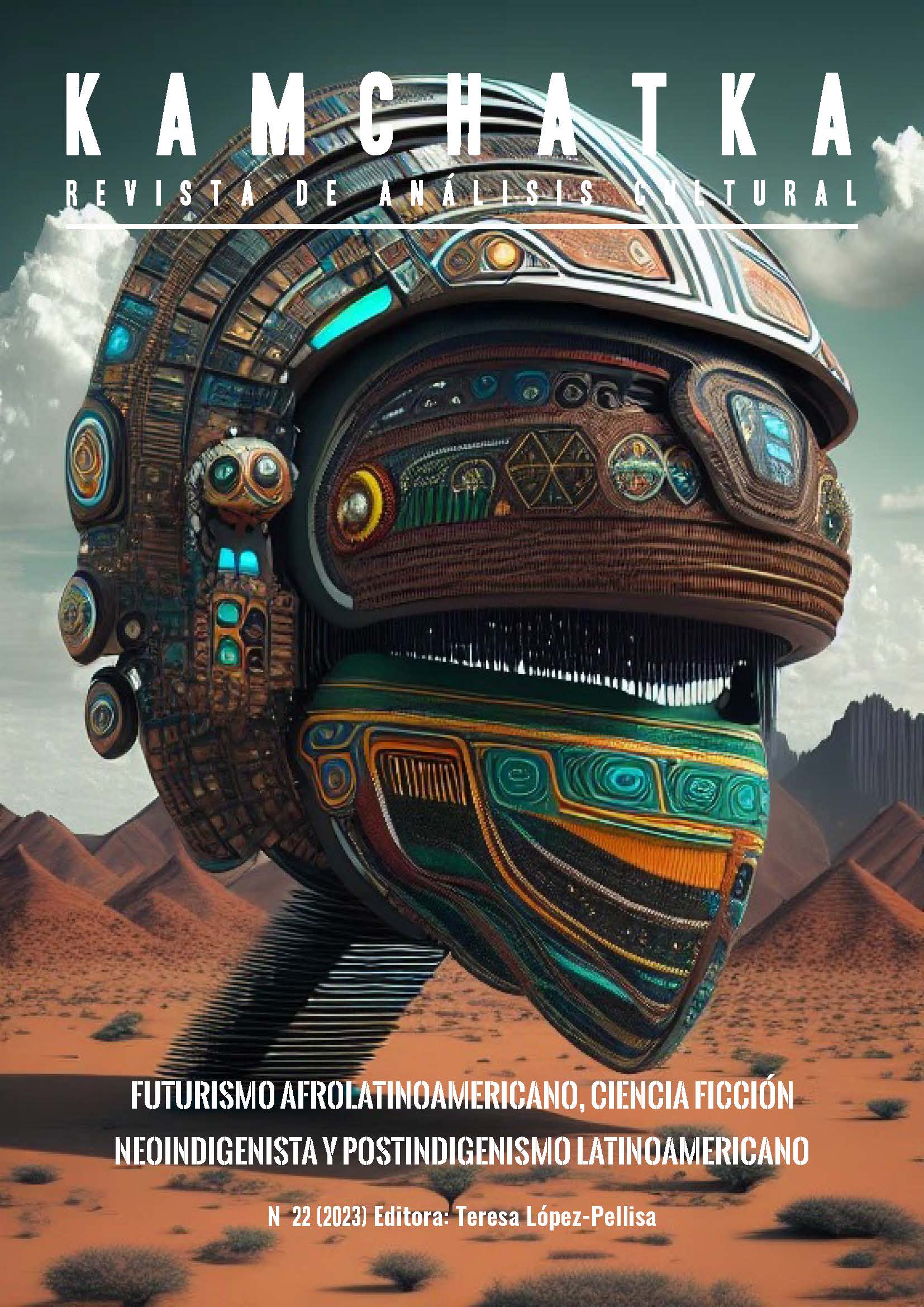Beyond Anglo-Saxon Afrofuturism: Caribbean Futurism and Santería in Rita Indiana’s La mucama de Omicunlé
DOI:
https://doi.org/10.7203/KAM.22.24223Keywords:
Hispanic Caribbean, cultural identity, speculative literature, cultural studies Abstract
Abstract
The term Afrofuturism refers to an aesthetic-artistic label coined in the 1990s to indicate cultural products in which imaginary hypertechnological futures welcome the triumphant return of pre-diasporic African identity in a context of overcoming racial differences. However, the term Afrofuturism is not easily adaptable to speculative products produced outside the African-American framework. Indeed, in different chronotopological contexts, such as the Hispanic Caribbean, the elements that refer to colonial and Afro-diasporic history acquire original features. This paper proposes a descriptive analysis of the novel La mucama de Omicunlé (2015) by the Dominican writer Rita Indiana as an example of the Caribbean futurist speculative-projective current.
 Downloads
Downloads
 References
References
Aboy Domingo, Nelson (2017) Historia de la Santería cubana. La Habana: UnosOtrosCultural Project.
Benítez Rojo, Antonio (2010). La Isla que se repite:el Caribe y la perspectiva postmoderna. San Juan: Editorial Plaza Mayor.
Casimir, Jean San Juan (1997). La invención del Caribe. San Juan: Edición de la Universidad de Puerto Rico.
Dery, Mark (1994). “Black to the Future: Interviews with Samuel R. Delany, Greg Tate, and Tricia Rose”. Flame Wars: The Discourse of Cyberculture. New York: Duke University Press: 179-222.
Dussel, Enrique (1996) Filosofía de la liberación. Bogotá: Nueva America.
Foucault, Michel (2002). La arqueología del saber. Argentina: Siglo XXI.
Gilroy, Paul (2014). Atlantico negro. Modernidad y doble conciencia. Madrid: Akal.
Haraway, D. J. (1984): Ciencia, cyborgs y mujeres. La reinvención de la naturaleza. Madrid: Cátedra.
Humphrey, Paul. “‘El Manto Que Cubre El Mar’: Religion, Identity, and the Sea in Rita Indiana’s La Mucama De Omicunlé”. Sargasso: A Journal of Caribbean Literature, Language & Culture 1 (2016/2017): 109–125.
Jones, Zachary y Betsy (s.f.). “Nombres y animales (Rita Indiana): Una guía musical”. Zambombazo. Lengua, Música y Cultura. Manzoni, Celina (et. Al) (2021). Configuraciones del trópico: urdimbres y debates en la cultura caribeña. Ciudad Autónoma de Buenos Aires: Katatay.
Molano, Olga Lucía. “Identidad cultural un concepto que evoluciona”. Revista Opera 7 (2007) 69-84.
Mota, Erick J. (2020). “¿Un nuevo afrofuturismo en el Caribe del siglo XXI?”. Cuasar. Ciencia Ficción y Literatura Fantástica.
Lander, Edgardo (1993). La colonialidad del saber: eurocentrismo y ciencias sociales. Perspectivas latinoamericanas. Buenos Aires: Clacso.
Rita Indiana (2013). La mucama de Omicunlé. Cáceres: Editorial Periférica.
Soares, Kristie. “Dominican Futurism: The Speculative Use of Negative Aesthetics in the Work of Rita Indiana”. Meridians: feminism, race, transnationalism” 19 (2020): 401-426.
Toliver, Stephanie .R. “Afrocarnival. Celebrating Black Bodies and Critiquing Oppressive Bodies in Afrofuturist Literature”. Child Lit Educ 52(2021): 132–148.
Womack, Ytasha L. (2013). The World of Black Sci-Fi and Fantasy Culture. Chicago: Review Press.
Downloads
Published
How to Cite
-
Abstract752
-
Artículo PDF (Español)565
Issue
Section
License
This journal provides an immediate free access to the content on the principle that freely make investigation available to the public, which promotes an increased global knowledge exchange.
Unless otherwise indicated, texts published in this journal are under the license Attribution-NonComercial 4.0 by Creative Commons. These texts may be copied, distributed and publicly communicated whenever the publication’s author and title are quoted and whenever they are not used for commercial purposes. In any case, intellectual property of the articles and its potential economic rights entirely belong to its authors.
The full license can be consulted on https://creativecommons.org/licenses/by-nc/4.0/. We encourage authors to disseminate papers published in Kamchatka. Journal of cultural analysis electronically, in institutional digital repository or in their websites.





